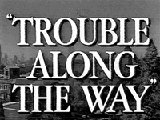| The Trouble in Trouble Along the Way: John Wayne and the Fusion of On and Offscreen Identities (page two) | |
|
| |
|
Whereas the extra-marital affair positions Anne/Chata as uncaring, Williams' concealment of the story--he refuses to tell Alice why he won't let Carol visit her mother--presents him as chivalric. Anne's infidelity is revealed through an interior moment, a silent Wayne mindscreen. This distinction presents Wayne as a gentleman who doesn't speak ill of women. However, this narrative thread differs greatly from the later actions of the offscreen Wayne. Following charges of domestic violence and extra-marital affairs, Wayne, in order to protect his reputation and image, unleashed a salvo of his own. After three days of testimony, Wayne took the stand on October 28th and said Chata was "too intoxicated" to run her own household, ran around with "other men," and he strongly suggested that she was having an affair with hotel heir Nick Hilton. Wayne said the top sheet of the household memo pad was covered with Chata's doodling which read: "Chata and Nick." In her twelve minute rebuttal, Chata made no attempt to explain the doodlings. She said Hilton had been a guest in her home. The judge apparently wasn't impressed. An hour later he granted the divorce in terms that favored Wayne.
A further intertextual connection between offscreen troubled Wayne and onscreen Trouble Wayne can be found in the differing courtroom testimonies. Wayne's testimony established Chata's guilt. Donna Reed's testimony, the denouement of Trouble Along the Way, reveals differing degrees of guilt: her own, Mrs. McCormick's and Steve's. Alice admits that she loves Steve and reveals the darkness of Anne: "I allowed Mrs. McCormick to use me for her own ends. It finally came clear to me that she has no real affection for her own child. Her whole purpose was to hurt Mr. Williams." But she also maintains that Steve, through his deception of the church in order to create a winner on the gridiron, is no fit father for the girl. Although, Alice contends he means well, a girl needs a stronger, moral anchor. Thus within the filmic testimonies, Wayne's character is presented as loving but lacking in symmetry, the necessary moral education that will give Carol the balanced upbringing she needs. Michael Curtiz's conclusion to the film visually provides those symmetries.
Trouble Along the Way may have been marketed by the publicity department as a text in the Going My Way tradition, but the trouble within its title had a dual meaning for audiences of 1953. This nearly-forgotten Wayne film, rewatched within the context of a star's marital woes, provides an interesting case study of how a film star may manipulate the medium to create a favorable reading strategy for offscreen events. In other words, a film persona within a given text (Wayne as loving father, a morally unsound but hard-working coach, and chivalrous gent) can override and blur an offscreen reading of a star (Wayne as abusive, violent, promiscuous and dirt-digging). Although we can't know Wayne's motives for choosing this interesting, off-beat role, we can speculate on how the film's positioning between preliminary hearing and divorce trial may have affected his audience and protected his star image. After all, the divorce trial was primarily about Wayne's persona, preserving goodwill between himself and his fans, and Trouble Along the Way, a box-office success, no doubt enhanced and built upon that need.
 Go to sources. Photo Credits: Warner Home Video. |
 |
 |
 |
 |
 |
 |









 In a flashback, Williams leaves during a drizzling football game, hurries home and discovers his wife embracing on the couch with Mr. McCormick, a man she will later marry. As Anne and McCormick extricate themselves from the home, Wayne asks, "She said I beat her?" "Yeah," McCormick responds, and Wayne drolly adds, "They always do." This charge of false accusation resonates both onscreen and off and raises possible questions of Chata's honesty.
In a flashback, Williams leaves during a drizzling football game, hurries home and discovers his wife embracing on the couch with Mr. McCormick, a man she will later marry. As Anne and McCormick extricate themselves from the home, Wayne asks, "She said I beat her?" "Yeah," McCormick responds, and Wayne drolly adds, "They always do." This charge of false accusation resonates both onscreen and off and raises possible questions of Chata's honesty.
 The final pairings of Carol/Alice and Williams/Father Burke suggest bridges to be mediated. Carol, who has become a ward of the state, leaves with Alice, and Wayne shouts she has "nice legs." Carol, an arm behind Alice's back, gives the okay sign to her father, indicating that she'll work on Alice for him. Their departing two-shot, within the film's ideology, hints Alice will provide the mother Carol needs and eventually they'll form a family. The two men's departure resituates Wayne/Williams within the larger community. Father Burke rehires Williams as coach at St. Anthony's and he provides the necessary spiritual balance to dent some of Wayne's amorality. Williams' love for his daughter has also reinvigorated the father who had allowed himself "to misjudge a man who's only concern was not for himself but for his child." Through Williams, Father Burke, who had seemed only obsessed with saving the school, now has reconnected himself to people. Although the genders are visually separated there are several hints at reconciliation: Williams has a steady job, a strong character witness in Father Burke, and a daughter who can smooth things over with the child welfare officer, or as Wayne promises Carol: "Everything is going to turn out all right. It's eight to five we'll be back together."
The final pairings of Carol/Alice and Williams/Father Burke suggest bridges to be mediated. Carol, who has become a ward of the state, leaves with Alice, and Wayne shouts she has "nice legs." Carol, an arm behind Alice's back, gives the okay sign to her father, indicating that she'll work on Alice for him. Their departing two-shot, within the film's ideology, hints Alice will provide the mother Carol needs and eventually they'll form a family. The two men's departure resituates Wayne/Williams within the larger community. Father Burke rehires Williams as coach at St. Anthony's and he provides the necessary spiritual balance to dent some of Wayne's amorality. Williams' love for his daughter has also reinvigorated the father who had allowed himself "to misjudge a man who's only concern was not for himself but for his child." Through Williams, Father Burke, who had seemed only obsessed with saving the school, now has reconnected himself to people. Although the genders are visually separated there are several hints at reconciliation: Williams has a steady job, a strong character witness in Father Burke, and a daughter who can smooth things over with the child welfare officer, or as Wayne promises Carol: "Everything is going to turn out all right. It's eight to five we'll be back together."